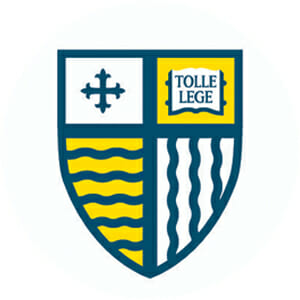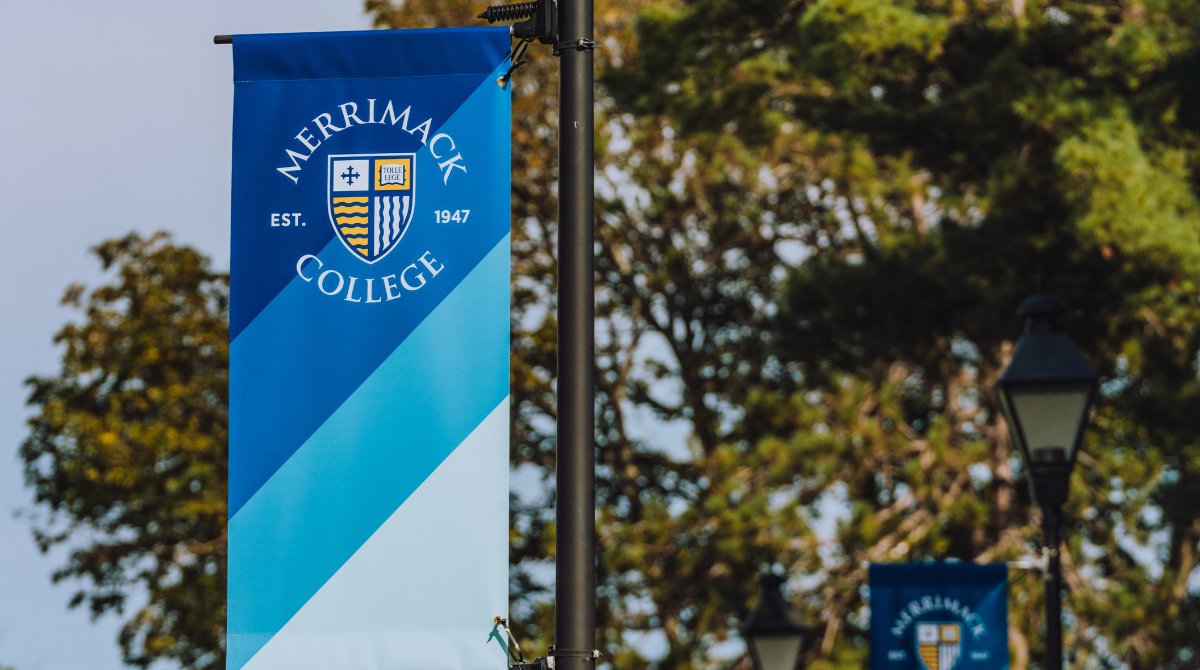GIRARD SCHOOL OF BUSINESS
SCHOOL OF EDUCATION AND SOCIAL POLICY
SCHOOL OF ARTS AND SCIENCES
SCHOOL OF ENGINEERING AND COMPUTATIONAL SCIENCES
SCHOOL OF NURSING AND HEALTH SCIENCES
The Master of Science in Nutrition and Human Performance at Merrimack College is a new and innovative program to prepare Registered Dietitian Nutritionists.

Learn about the Merrimack College community, application process, financial aid, your program's curriculum, professional opportunities, fellowships and more!
Effective January 1, 2024, the Commission on Dietetic Registration (CDR) will require a minimum of a master’s degree to be eligible to take the credentialing exam to become a registered dietitian nutritionist (RDN). In addition, CDR requires that individuals complete coursework and supervised experiential fieldwork accredited by the Accreditation Council for Education in Nutrition and Dietetics (ACEND). In most states, graduates also must obtain licensure or certification to practice. Graduates who successfully complete the ACEND-accredited, Future Education Model (FEM) dietitian nutritionist program at Merrimack College are eligible to apply to take the CDR credentialing exam to become an RDN.
Merrimack College’s Future Education Model program is one of the first demonstration programs in Massachusetts and the New England region — and one of the few in the country — with a focus on human performance and sport nutrition. Merrimack College differentiates itself from other programs by maintaining its reputation as a student-centered and supportive community that excels in professional graduate education and by remaining grounded by its mission to enlighten minds, engage hearts and empower lives.
The program is one of the first Future Education Model (FEM) degree programs in the New England region. Future Education Model degree programs are competency-based education programs that integrate classroom learning with hands-on supervised experiential learning activities. The program’s curriculum is guided by competencies and their respective performance indicators, thus it fosters work readiness.
Successful completion of this one-step program meets the educational requirements needed to sit for the Commission on Dietetic Registration (CDR) exam. This one-step approach is different from the more common two-step approach requiring the need to competitively apply to a supervised practice program after earning a degree with no guarantee of acceptance.
Our program is one of only a few FEM programs that focuses on human performance. You will have the opportunity to work with Merrimack College’s Division I athletes as well as with other DI athletes within the New England region.
You’ll study nutrition and human performance in small classes led by highly engaged and knowledgeable instructors. Our faculty experts include scholars such Dr. Leena Bharath, Dr. Juliana Cohan and Dr. Michael Corcoran.
Tune in to the latest Grad Chat episode dedicated entirely to Merrimack’s Master of Science in Nutrition and Human Performance. In this insightful discussion, three second-year students—Erika Bodnar, Alyssa Costantino, and Dominic Pisello—share their experiences and shed light on the program’s unique features. Discover the distinctive focus on sports and human performance, and learn about the seamless integration of internships into the curriculum. You will hear about the program’s structure, encompassing classes and clinical rotations, and gain valuable insights into how it prepares students for the Registered Dietitian (RD) exam. The discussion highlights the program’s commitment to professional development and creating a supportive community. The cohort model is praised as “awesome” by students, emphasizing the value of diverse experiences gained through clinical rotations. Join this can’t-miss conversation that covers everything from coursework challenges to the fulfilling journey of pushing beyond your comfort zone. If you’re interested in Merrimack’s Master of Nutrition and Human Performance, this episode is a must-listen!
In the Master of Science in Nutrition and Human Performance, you will prepare to be a competent, entry-level registered dietitian nutritionist (RDN) capable of implementing safe, effective, evidence-based care. During the program, you will learn to synthesize, critically evaluate, and apply advanced knowledge and skills as a collaborative dietetics practitioner to effectively address contemporary nutrition-related issues.
The M.S. graduate program includes 56 credits spanning across 4 semesters, and uses the summer months as an opportunity for supervised experiential learning experiences. The initial semester provides foundational knowledge, while subsequent semesters provide a greater depth of knowledge and skills development. Some 1,000 hours of supervised experiential learning are integrated across the curriculum in a professional work setting, with additional alternative experiential learning experiences such as simulation activities embedded into specific courses.
The coursework has been designed for students to be able to achieve the standards and competencies outlined by the Accreditation Council for Education in Nutrition and Dietetics (ACEND) Future Education Model (FEM).
When you graduate from the master’s program in nutrition and human performance, you will be well-positioned for a successful career in the growing job market for dietitians and nutritionists. It is projected that jobs in Dietetics and Nutrition will grow by 11 percent between the years of 2018 and 2028, which is much faster than the average job growth for all occupations. According to the U.S. Bureau of Labor Statistics, the median annual wage as of 2019 for Registered Dietitians and Nutritionists in Massachusetts was $72,610, with the median hourly compensation of $34.91.
Merrimack’s Master of Science in Nutrition and Human Performance will prepare you for employment as a Sports Dietitian and in environments such as:
The Master of Science in Nutrition and Human Performance fits squarely within Merrimack’s Augustinian tradition and the mission of the School of Health Sciences.
The mission of Merrimack’s School of Nursing and Health Sciences is to provide a quality, innovative education built upon strong science, emerging technologies, and real-world foundational experiences, integrated with the liberal arts and shaped by Augustinian traditions. Our vision is to be broadly recognized as a leader in the preparation of highly skilled, compassionate, ethical health professionals.
The mission of the Master of Science in Nutrition and Human Performance program is to prepare entry-level registered dietitian nutritionists through student-centered, innovative education with integrated experiential learning, and instill the skills and knowledge necessary for graduates to deliver evidence-informed, culturally competent care, and meet the diverse needs of individuals and communities.
With a focus on quality, experiential educational opportunities, and a strong foundation in the sciences, the mission of the program expands upon the missions of Merrimack College and the School of Nursing and Health Sciences with its specific emphasis on dietetics. The mission of the program is unique within Merrimack College but aligns directly with the mission of Merrimack College and the School of Nursing and Health Sciences. The program will be the only program at Merrimack College with a mission of preparing competent graduate-trained registered dietitian nutritionists (RDNs).
Program Goal 1: To prepare graduates to become competent entry- level registered dietitian nutritionists.
Supporting Objectives:
At least 80% of students complete program requirements within 3 years (150% of the program length)
At least 80% of program graduates will take the Commission on Dietetics Registration (CDR) credentialing exam for dietitian nutritionists within 12 months of program completion.
The program’s one-year pass rate (graduates who pass the registration exam within one year of first attempt) on the CDR credentialing exam for dietitian nutritionists is at least 80%.
Of graduates who seek employment, at least 90% are employed in nutrition and dietetics or related within 12 months of graduation.
At least 80 percent (80%) of employers/supervisors who respond to our survey will report graduates “satisfactory” or better as effective entry-level RDN practitioners.
Program Goal 2: To prepare graduates to provide evidence-informed, culturally competent care.
Supporting Objectives:
Of employed graduates who respond to the alumni survey, at least 80% will rate themselves as adequately or very well prepared to provide evidence-informed, culturally competent care.
Of employers responding to our survey, at least 80% will rate their satisfaction as satisfied or highly satisfied with the program graduate demonstrating culturally competent nutrition services.
Of employers responding to our survey, at least 80% will rate their satisfaction as satisfied or highly satisfied with the program graduate demonstrating evidenced informed nutrition services.
The Master of Science in Nutrition and Human Performance degree requires a minimum of 56 credits of course work. Students will ordinarily complete the graduate program within two years. However, students are permitted a maximum of six years to complete the program requirements applicable at the time the student enrolls, as outlined in Merrimack College policy.
The two-year program duration is comprised of four semesters and one summer session period. Integrated across the curriculum will be 1,000 hours of supervised experiential learning in professional work settings with additional alternative experiential learning experiences (e.g., simulation activities, case studies) embedded into specific courses. Supervised experiential learning hours in professional work settings will be tailored according to each student’s focus, but are classified into five 200 hour rotations, in:
The program length is designed to ensure the achievement of core competencies and is aligned with the program’s mission, objectives, and learning outcomes.
Program Requirements:
Selected courses may be offered via distance education.
Visit the Merrimack Course Catalog for more detailed course descriptions or the Merrimack Academic Calendar for specific dates relevant to the current academic year.
Applicants to the Master of Science in Nutrition and Human Performance must have earned a bachelor’s degree with a 3.0 overall GPA. Applicants must have completed the required prerequisite courses and have earned a grade of B or better before beginning the Master of Science in Nutrition and Human Performance.
Please note: The prerequisite courses are subject to change
Required prerequisite courses need to be completed before beginning the program in the fall, but they do not need to be completed before applying to the program. Prerequisites may still be completed in the spring or summer before beginning the program in the fall. Students may be enrolled with up to fifteen credits of outstanding prerequisite courses the semester they apply to the program and must demonstrate proof of enrollment in those courses in their application.
Currently the Master of Science in Nutrition and Human Performance does not have a policy to evaluate and award credit for prior learning for course work or supervised experiential learning.
There is no fee to apply, and there is no GRE requirement. However, we encourage you to submit test scores if you feel they will support or enhance your academic background.
Completion requirements of the nutrition and human performance graduate degree program include successful completion of all academic coursework and supervised fieldwork with a grade of “B” or better and an overall GPA of 3.0 or greater. Successful completion of competency-based assessments with an overall experiential fieldwork learning performance rating of “met expectations” or higher from preceptors for all entry-level competencies and completion of at least 1000 hours of supervised fieldwork is also required.
Students will ordinarily complete the program within two years. However, students are permitted a maximum of six years to complete the program requirements applicable at the time the student enrolls, as outlined in Merrimack College policy.
Graduates of the program will receive a Master of Science in Nutrition and Human Performance and a verification statement upon successful completion of the program requirements. Upon meeting the requirements for graduation, students will receive a verification statement enabling them to take the Commission on Dietetic Registration (CDR) credentialing examination to become a Registered Dietitian Nutritionist (RDN).
While the Master of Science in Nutrition and Human Performance delivers exceptional value, here’s what you need to understand the other part of the cost-benefit equation before pursuing your graduate degree.
The graduate degree program in nutrition and human performance is subject to the overall tuition and fee structure for Merrimack’s master’s degrees and graduate certificate programs. Visit the Bursar’s Graduate Tuition and Fees page for up-to-date cost information.
Students in the Master of Science in Nutrition and Human Performance may incur additional program-related expenses for:
Application requirements for international applicants include:
Detailed information on international application requirements and information on how to apply can be found here.
An official course-by-course evaluation of your academic credentials is required if you attended an institution of higher education outside of the United States. You may use any NACES-member organization. Either World Education Services (WES) and Educational Credential Evaluators (ECE) are recommended. The evaluation must be issued and sent directly to Merrimack College Graduate Admission. If electronic delivery is available, please have it sent to graduate@merrimack.edu.
We do not offer scholarships or fellowships that provide full funding. All applicants are automatically reviewed for scholarships, depending on the strength of their application and the graduate program for which they are applying. These awards typically cover around 10-15% of the price of tuition. It is dispersed evenly throughout the program and displayed in your admission letter. All graduate students also have the option of obtaining private loans and/or enrolling in an institutional payment plan.
Applicants whose first language is not English and who have not earned an academic degree in the U.S. must submit proof of English proficiency. For more information or see the most asked questions visit here.
If you need further assistance, please reach out to us at graduate@merrimack.edu or 978-837-3563.
The Accreditation Council for Education in Nutrition and Dietetics (ACEND) released the Future Education Model Accreditation Standards for programs in nutrition and dietetics. These accreditation standards integrate didactic coursework with supervised experiential learning in a competency-based curriculum designed to prepare nutrition and dietetics practitioners for future practice. Program graduates will be eligible to take the Commission on Dietetic Registration (CDR) credentialing exam to become a Registered Dietitian Nutritionist.
The Master of Science in Nutrition and Human Performance program is a Future Education Model candidacy program seeking accreditation by:
Accreditation Council for Education in Nutrition and Dietetics
120 South Riverside Plaza
Suite 2190
Chicago, Illinois 60606-6995
Phone: (800)-877-1600 ext 5400
E-mail: acend@eatright.org
acend@eatright.org, https://www.eatrightpro.org/acend
Program outcomes data are available upon request.

Contact the Merrimack College Office of Graduate Admission at graduate@merrimack.edu.
Students enrolled in the Master of Science in Nutrition and Human Performance may be eligible for scholarships, which provide additional support to limit your expenses and debt burden.
Create your account to get started. Start your Master of Science in Nutrition and Human Performance today.
"*" indicates required fields
The Jail Education Project in July will award its first associate’s degree, and has helped nine formerly incarcerated students transition to Merrimack’s Bachelor’s Degree Completion Program.
